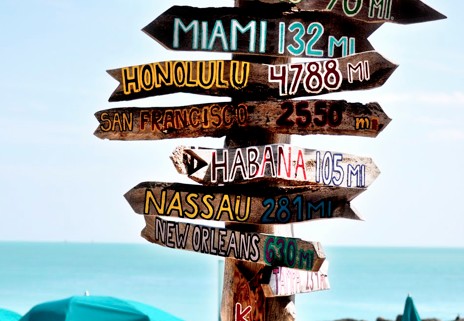Without a drastic change in public awareness of what is really going on and a corresponding change in political will to ameliorate the predicaments that we are in. (I don't say solve problems because the situations we are in don't have complete solutions to avoid all pain - we can reduce the total pain experienced by addressing the issues now or we can put off the pain for a while with the promise of greater pains later)
With all the study and thought that are required to make sense out of how the Great Unraveling will play out, we seldom take time to think of what it will be like on the other side. Those of us who are, by nature, long-term thinkers and/or optimistic, have a vague picture in mind of a rebirth of libertarian thinking, and a vibrant economy. However, we tend not to think too much more about these hopes than that, because we are caught up in the Great Unraveling itself - a very time-consuming topic.
The other day, an associate whom I like to think of as having a decent, if not holistic, view of the present depression, commented to me, "I wish we could just have the crash tomorrow and everything that goes with it, so that, next year, we can get back to normal."
Oops ... maybe his expectations are a bit more simplified than I thought. And, if others share his view, possibly the topic needs a bit of fleshing-out. While it may not be ready to be a prime topic of the ongoing conversation, possibly an outline of what may happen after all the fireworks have gone off would be in order.
Ten Years Down and Ten Years Up
Economic wizard (and favourite 'Uncle') Harry Schultz stated back in the early 2000's that what he anticipated was "ten years down and ten years up." At the time, many thought that his projection was extremely prolonged. I didn't think so. People do commonly seem to take the view that, once the various crashes have taken place, we simply walk out into the sun, brush the dirt off the knees of our trousers, and, with a spring in our step, walk into the bright new day.
However, a depression is not at all like that. It is more like a town after a hurricane has hit. The storm may have been swift, but the recovery is not. Power lines are down. Roads are blocked. Homes and stores have been destroyed. Having personally been highly involved in the reconstruction of a small country after the devastation wrought by a category five hurricane, I can attest that, even if the population is hardworking and motivated (which they were), the task of rebuilding is monumental, and the time period required to achieve it is prolonged.
I see the period after the various crashes very differently from those who anticipate immediate recovery symptoms. This is not because I imagine myself a visionary; my view is based on history. If we look at the economic collapses of the past, (inclusive of their possible knock-on effects, such as hyperinflation and destruction of the currency), from the fall of the Roman Empire to Weimar Germany, to Argentina and Zimbabwe - take your pick - the pattern is extremely similar.
So, let's have a look at that pattern and ask ourselves if the present situation might not play out much the same (except far worse and more prolonged, as the conditions that led to this particular depression have been more extreme). The various stages are likely to be a given, but the various factors within each stage are a bit more uncertain. In every major economic collapse, some combination of these factors takes place.
Also, consider that the stages themselves are like dominoes - they almost always fall in order. The reason? Details change in history, but human nature remains the same. The same knee-jerk reactions by people will repeat themselves over and over. (As an example, we are now experiencing a decline in exports from the First World. I believe that a repeat of the disastrous Smoot-Hawley Tariff of the 1930's will be passed in America, which undoubtedly would trigger increased hardship for Americans.)
Stages of The Crash
The stages are laid out below. The first three have already occurred.
1 INITIAL CRASHES
- Crash of the residential property market
- Crash of the commercial property market
- Crash of the stock market
2 INITIAL KNOCK-ON EFFECTS OF CRASHES
- Loss of homes
- Loss of jobs
- Inflation
3 IMMEDIATE ACTIONS BY GOVERNMENT
- Bailouts for select groups
- Dramatic increase of debt
- Politicians going in the opposite direction of a real solution
The first knee-jerk reaction began immediately, with the Government attempting to "make the problem go away" as quickly as possible. Almost invariably, at this stage, the corrective strategy is hastily prepared and shortsighted, assuring further deterioration of the economy.
In this stage, the politicians on both sides fail to focus on a real solution. Instead, their primary focuses are, first, to avoid a painful real solution, and, second, to engage in finger-pointing, each political party blaming the other for the problem. The problem worsens steadily until one of the next series of major dominoes falls. This is usually sudden and triggers the toppling of other dominoes.
4 SECOND WAVE OF CRASHES
- Major crash in stock market
- Currency plummets
- Increased bankruptcies
- Increased unemployment
5 INTERNATIONAL TRADING PARTNERS REACT
- Foreign countries refuse to accept more debt
- Foreign trade slows dramatically
At this point, the Government introduces dramatic change, such as ill-conceived protectionism, which backfires almost immediately.
6 GOVERNMENT INSTITUTES DESPERATE SELF-DESTRUCTIVE MEASURES
- Defaults on debt
- Restrictive tariffs on imports
- Currency controls
7 ECONOMY REACTS IN LOCKSTEP TO GOVERNMENT ACTIONS
- Hyperinflation - dramatic increase in food and fuel costs
- Massive unemployment
- Extensive foreclosures
- Extensive bankruptcies
At this point, the dominoes are tumbling quickly, and a rapid unraveling of control is about to take place.
8 SYSTEMIC COLLAPSE
- Bank closures
- Extensive homelessness
- Food and fuel shortages
- Electric power becomes sporadic, blackouts common
As these factors unravel, the public mood turns to a combination of blind fear and anger.
9 SOCIAL COLLAPSE
- Crime rises dramatically (particularly street crime)
- Food riots
- Tax revolts
- Squatters' rebellions
10 MARTIAL LAW
- Creation of special army to address "domestic terrorism"
- Random killings become commonplace
At first, the authorities focus mostly on violent subjugation and arrests; then, as prisons quickly become hopelessly overcrowded, camps become the norm. Soon, these too become unmanageable, particularly as a result of high cost of food and manpower. At that point, the solution turns to the killing of anyone who is suspected of a crime and, more frequently, anyone who is not submissive. (This will not resemble the Gestapo of the late 1930's. It will be less organized and more chaotic.)
11 REVOLUTION
If revolution is to occur, it will happen at this point. Many people will feel that they have nothing to lose, and anger will be at its peak. If revolution does take place, it will not be an organized movement as such. It will be spontaneous, and breakouts will manifest themselves like popcorn popping, largely at random, with ever-increasing frequency. At some point, it may possibly evolve into something more organized.
The above article concludes the assessment of the first phase of the Greater Depression - the downward wave. Next week's article will explore the upward wave - the Recovery.
From http://www.internationalman.com/global-perspectives/after-the-storm-the-11-stages-of-the-crash
This entry was posted on August 14, 2012 at 5:33 PM and has received 713 views. There are currently 0 comments.
Print this entry.
 I recently traveled on American Airlines and LAN from Washington DC to Cusco Peru. I had a 69 lb suitcase, a 58 lb duffel bag and 15 lb backpack and a handbag. I was concerned at having to pay for two overweight bags at $100 each according to AA's website. I knew the minimum fee would be $30 for one extra bag (AA gives you one 50 lb bag for free on international flights).
I recently traveled on American Airlines and LAN from Washington DC to Cusco Peru. I had a 69 lb suitcase, a 58 lb duffel bag and 15 lb backpack and a handbag. I was concerned at having to pay for two overweight bags at $100 each according to AA's website. I knew the minimum fee would be $30 for one extra bag (AA gives you one 50 lb bag for free on international flights).
